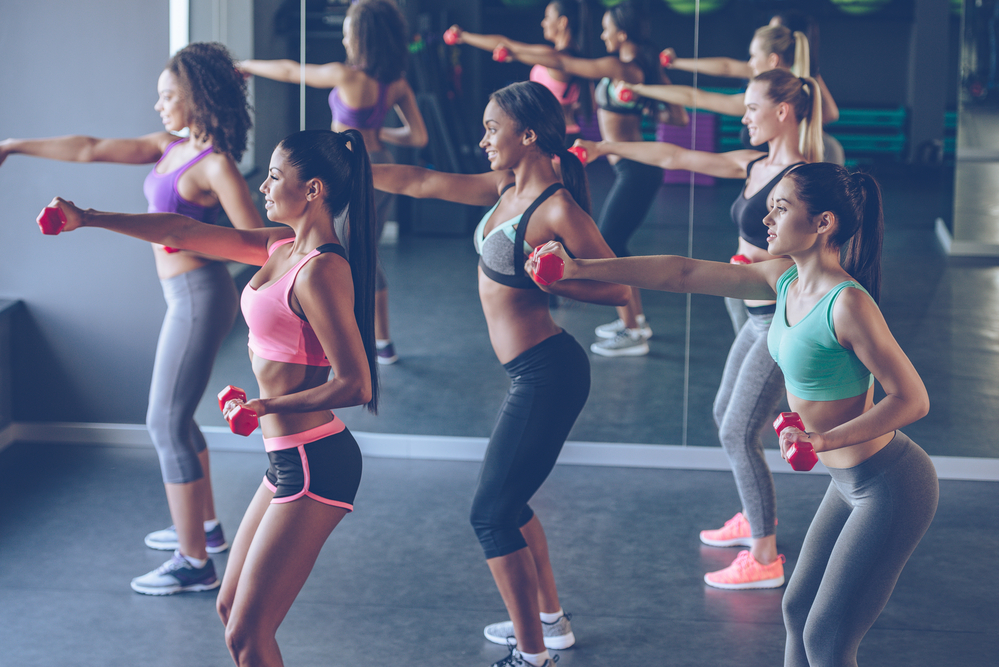There are several advantages to working out at home rather than going to the gym. At-home workouts are more private and convenient, and they’re almost always cheaper than a health club membership.
Generally, working out at home means you don’t have to find someone to watch your kids and you can do it whenever you like.
But there are a few drawbacks as well. One way to stay healthy is to purchase equipment and set up an at-home gym. If you’re not used to buying workout equipment or planning your own fitness program, the job can seem daunting.
You might be tempted to buy things that are bulky or expensive even though you don’t need them and don’t have space to store them.
You can find fitness equipment to fit your budget and space no matter what your fitness goals are.
Basic Considerations
Before you start buying equipment for exercising at home, take some time to evaluate the space where you plan to do it.
It is recommended that you find an area that is at least six feet by six feet so that you have enough room to move around comfortably and safely.
You’ll need more space for some workouts, but a six-foot square area is a decent place to start for a basic workout.
If you don’t have a six-foot square area to start with, you can still perform some exercises. Take care to not trip over or bump into anything as you walk.
Equipment Storage
After you have decided what type of equipment you need, you should think about whether or not you will need to store it. If your home-gym is in a room that is also used for other purposes, you may not want the equipment out all the time.
Consider potential storage spaces that are not being used, such as behind a couch or under the bed.
The equipment you store may help you determine which equipment to buy.
For example, if you are trying to build strength and do workouts in your small bedroom, you might want to use resistance bands or body bars instead of kettlebells or dumbbells. This is because bands and bars can be rolled under your bed, whereas kettlebells and dumbbells are much bulkier.
Safety Concerns
Keep in mind that if you have young children in the home, you should store your equipment in a place where they can’t reach it.
Children are at risk of injury when they have unsupervised access to mechanical exercise equipment, weight training equipment, and even simple equipment like jump ropes.
Safety Tip
Parents should be aware of safety features in home gyms and be careful to avoid injuries to children or others in the home.
When it comes to home exercise equipment, it is important to improve safety by ensuring that parents are educated on its use and that children have limited access to it.
Fitness Goals
After you have considered your diet and sleep habits, take a look at your fitness goals and how active you currently are. If you do not work out regularly, you may want to start with small steps and buy workout equipment for your home carefully.
If, for example, you have been inactive for some time, you might set a goal to do an online yoga class three times a week.
The investment required is small, and the objective is achievable. This can help you set yourself up for success. As you commit to your workout routine, slowly build up your at-home gym.
Design an At-Home Workout Routine
Working out a variety of muscle groups and using different types of workouts keeps you fit and prevents injury. How much variety do you need?
Any good workout routine should include both aerobic and strength training.
The CDC recommends that all adults get at least 150 minutes of moderate-intensity physical activity, as well as two days of total-body muscle-strengthening activities, each week.
Adding more time to your workouts or making them more challenging will result in even better health.
Aerobic exercise is any activity that gets your heart rate up and makes you breathe harder. This includes activities like walking, running, and cycling.
If you are stuck at home and want to train aerobically but don’t have any equipment, try doing low-intensity exercises with minimal rest in between, Rhodes explains.
Do the exercise for one minute, then rest for 30 seconds. Repeat this cycle up to 15 or 30 minutes. You can tailor the amount of time you spend working and resting to the exercises you’re doing and how they feel.
You can maintain a high heart rate and work on improving your cardiovascular strength rather than your muscular strength. Some bodyweight exercises to try it with include:
- Lunges
- Pushups
- Squats
- Planks
- Pullups
- Glute bridges
It is important to do strength-training exercises that focus on squats, lunges, deadlifts, hip thrusts, chest and shoulder presses, and rows.
The goal of these exercises is to strengthen the human body’s basic movement patterns. These exercises will provide the most benefit to the muscles that are used often and tend to get tired easily.
Not only do these moves work multiple muscle groups at the same time, but they are also efficient with time.
You can improve your strength workout by pushing your muscles to fatigue. This is when you feel your muscles burning and might only have a few more reps left.
If you want to increase the intensity of your workout, you can either increase the weights or resistance levels. You can also make bodyweight exercises more challenging by increasing your reps and sets, slowing down your movements, or trying an advanced exercise variation.
You could progress to a single-leg variation of the bodyweight squat, for example.
Take a day or two off per week for rest and recovery. Fitness routines will vary in the amount of recovery days needed based on the duration and intensity of the workouts.
You will need more time to recover between workouts if they are longer and harder. During a rest day, you can do things like walk, do yoga, foam roll, or stretch.
If You Want to Build Strength
There are many ways to set up your home gym for a strength-building workout, whether you are a heavy lifter or a new exerciser who wants to build muscle at home. In fact, the options are nearly endless.
The cheapest way to get stronger is to do bodyweight exercises. Strength training moves like push-ups, burpees, and planks can be very effective.
If you want to add variety to your workouts, you can invest in other types of weight training equipment.
If you’re new to strength training, you can use less expensive equipment like resistance bands and dumbbells. Some people even use everyday equipment to add resistance.
Bodybuilders may need to invest in more equipment and a bigger gym space in order to accommodate their workout routine. This would include a squat rack, barbells, and weight plates. You will need a large space for this equipment with good ventilation and a strong, dent-resistant floor.
Need to Have
You’ll need some basic equipment to provide resistance. You can either choose one type of equipment from the list below or mix and match different types of resistance.
- Body bar or Active motion bar
- Dumbbells
- Kettlebells
- Medicine ball
- Resistance bands
Make sure to have a few different levels of resistance when working out.
As an example, if you wanted to invest in dumbbells, you would need to purchase multiple sets at different weight ranges. Lighter weights would be necessary for exercises targeting smaller muscle groups like the biceps or triceps, while heavier weights would be required for exercises targeting larger muscles or multiple muscle groups.
Choose workout bands with different resistance levels.
In addition to a weight bench, you will need something to act as a weight bench, such as a fitness step with risers. The following exercises will require an elevated body position off the floor. These exercises include a chest press, pec fly, and hip thruster.
Nice to Have
Advanced lifters who are looking to increase their strength will benefit from having other types of equipment. This will help them target different muscle groups and get a well-rounded workout. If you’re comfortable lifting dumbbells or kettlebells, you should buy a barbell and weight plates for your home gym.
A barbell is a type of weight that is commonly used for many different types of body-building exercises. These exercises include a deadlift, back squat, front squat, or power clean.
Other optional equipment for your home gym might include:
- Adjustable dumbbell set
- Complete strength training home-gym system
- Large wall mirror to check form
- Power rack or squat rack
- Pull-up bar
- Stability tools for functional training (such as a Bosu or balance board)
- Suspension training system (like a TRX system)









